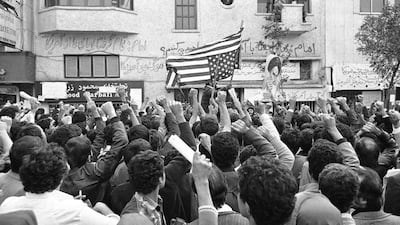Iran’s hardliners, left fuming and frustrated by President Hassan Rouhani’s outreach to the West, plan to hit back on November 4 with their biggest rally against the United States in years.
It was on that date in 1979 that militant Iranian students stormed the US Embassy in Tehran after the Islamic revolution and held 52 Americans hostage for 444 days. The event led to a rupture in diplomatic relations that continues until today and is seared into the American psyche.
It also gave birth to Iran’s most enduring revolutionary slogan: “Death to America” – or “Marg bar Amrika” in Farsi.
For more than three decades, clenched-fist chants of the slogan have been shouted in well-drilled unison at Friday prayers and other public events, where the Stars and Stripes are often also set ablaze.
But given Mr Rouhani’s drive to improve relations with Washington – and following his historic phone call with US president Barack Obama – the Iranian president has suggested it is time to decommission the time-worn chant.
“We can stand against powers which threaten our national interests with prudence rather than slogans,” Mr Rouhani said recently.
Certainly, the “Death to America” chant has long damaged Iran’s image in the West, although most official Iranian versions translate the slogan as “Down with America”, a less offensive phrase.
Few Americans, for instance, realise that the Iranian street is far less hostile to the US than they might think. Many younger Iranians sport Western clothes and hairstyles, hanker after US-style personal freedoms, and devour Hollywood movies. A rare opinion poll a decade ago revealed that 70 per cent of Iranians favoured establishing ties with Washington.
But Iran’s image abroad has long been skewed by more telegenic if unrepresentative footage of bearded revolutionaries bellowing “Death to America” at Friday prayers.
Akbar Hashemi Rafsanjani, an influential former president and key supporter of Mr Rouhani, recently called for the chant to be mothballed.
He claimed that even Ayatollah Ruhollah Khomeini, the founder of Iran’s Islamic revolution, suggested that the “Death to America” slogan could be dropped if it was in the national interest.
Such comments have infuriated many hardliners who view anti-Americanism as an ideological cornerstone of Iran’s Islamic revolution.
“There are elements in Iran who believe the chant and what it represents – a call for an end to imperialism and US hegemony rather than death to Americans – is crucial to the maintenance of the revolutionary spirit,” Hooman Majd, an Iranian-American author based in New York, said. “They believe without it and the animus against the US, the revolution will crumble.”
Hence some prominent hardliners are determined that this year’s commemoration of the embassy takeover will be more memorable than those in recent years when flagging fervour meant the authorities bussed in schoolchildren to fill out the crowds.
Brigadier General Masoud Jazayeri, the deputy commander for cultural affairs of the Revolutionary Guards, announced recently that a surreally named bureaucratic body – the “Death to the US Committee” – would be established to orchestrate the rally.
This will take place outside the high brick walls of the sprawling and long defunct former US embassy, which are festooned with anti-American murals and graffiti.
“The crimes of US leaders and international Zionism in dealing with Iran’s great nation will never be erased from public memories and minds,” Mr Jazayeri said. He listed the US-backed coup against Iran’s nationalist government in 1953 and current US-led sanctions as proof of American perfidy and hostility, past and present.
Particularly frustrating for some Iranian hardliners is that, for now at least, Iran’s supreme leader, Ayatollah Ali Khamenei, is supporting Mr Rouhani’s attempted conciliation of the West, hoping it will ease crippling sanctions imposed because of Tehran’s nuclear programme.
The ayatollah is deeply suspicious of the US but only mildly rebuked Mr Rouhani for his recent, ground-breaking phone chat with Mr Obama.
A majority of deputies in Iran’s hardline-dominated parliament has also backed Mr Rouhani’s outreach to the West.
“We used to shout ‘Death to the Soviet Union’ too, but, just as we’ve sorted things out with the Russians, so we can sort things out with the US,” Mohammad Taqi Rahbar, a prominent imam in Isfahan, told Qanun newspaper.
But, stoking the heated national debate on the slogan’s political propriety, a key hardline prayer leader in Tehran, Ayatollah Ahmad Khatami, publicly rejected any such move. “As long as there is American evil in the world, this slogan will endure across the nation,” he said this month.
It was his unrelated namesake, Mohammed Khatami, a popular reformist former president, who first tried to retire the chant more than a decade ago. He ensured, at least, that the slogan was not used at Friday prayers after the September 11 attacks on the US 13 years ago. Iran was foremost among Middle East nations to condemn that day’s terrorist outrages and held candlelit vigils for the victims.
Mr Khatami’s outreach to Washington was torpedoed just months later by George W Bush, the former US president, who branded Iran part of an “axis of evil”, along with North Korea and Saddam Hussein’s Iraq.
Now Iranian hardliners are relying on a big turnout on November 4 to show that widespread hostility to the “Great Satan” America is purportedly still alive and kicking.
Scott Lucas, an Iran expert at Birmingham University in England, said the Death to America slogan has not disappeared, “but it no longer carries the endorsement of senior figures in the regime”.
mtheodoulou@thenational.ae

